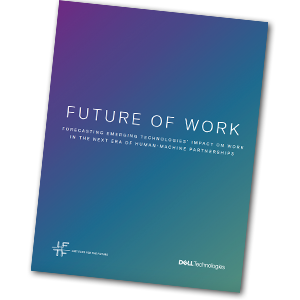Realizing 2030 The Future of Work

Technologies and Shifts that Will Profoundly Change
How Humans Work in 2030
 With thoughtful, creative, and bold foresight, we can develop, deploy, and govern emerging technologies that strengthen the partnerships between humans and machines and bolster employment opportunities, economic empowerment, and decent work for all.
With thoughtful, creative, and bold foresight, we can develop, deploy, and govern emerging technologies that strengthen the partnerships between humans and machines and bolster employment opportunities, economic empowerment, and decent work for all.
Increasing opportunities for more people and communities to pursue meaningful, creative and sustaining work is the cornerstone of both national and global efforts to improve economic prosperity by 2030, particularly for women and young people.
New technologies such as collaborative AI, sensory augmentation, extended reality, and blockchains have the potential to establish an inclusive and equitable environment that provides people with opportunities for meaningful, creative, and sustaining work. But this positive scenario isn't a sure thing. Without a forward-looking approach for applying emerging technologies these advances could work against us.
Our new free report, The Future of Work, was produced in partnership with Dell Technologies and represents many months of research, including interviews with experts and an all-day workshop with thought leaders from around the world. The report explores how emerging technologies could reshape the work environment
over the next decade and identifies four technologies that will combine to form human-machine partnerships
that could lead to an inclusive and rewarding work environment in 2030. But these emerging technologies
are just part of the picture. They will also intersect with social and economic forces to create new tensions
and challenges.
The human-machine partnerships emerging in the coming years can help realize the goals
outlined by the United Nations Agenda for Sustainable Development to build "dynamic, sustainable,
innovative and people-centered economies, promoting youth employment and women’s economic
empowerment, in particular, and decent work for all.”
For more information
Please contact Rachel Maguire | rmaguire@iftf.org.
For more on the breadth of IFTF's work in automation, jobs, and wealth inequality
Visit the Equitable Futures Lab or contact research director, Anmol Chaddha | achaddha@iftf.org.



